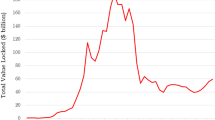Abstract
The implicit social compact between the big British banks and the U.K. government broke down in the 1980s. Since then, the banks have sought to maximize shareholder value by closing less profitable branches, thereby reducing access to finance and increasing risk taking. Post-1990, the big banks also substantially increased their dependency on wholesale funding and dramatically reduced their liquid asset holdings, which increased their leverage and risk exposure. The U.K. government’s response to the financial crisis was to encourage mergers between banks, increasing concentration in the industry. The government bail-outs allowed the big banks to enjoy free insurance paid by taxpayers. The establishment of an autonomous retail banking (and insurance) utility regulator and a system for taxing the big banks fairly is recommended.
Similar content being viewed by others
Notes
That cost efficiency is achieved by one or a few providers exploiting economics of scale
Which involves exploiting monopoly power to increase revenue.
References
Augar, P. (2009). Chasing Alpha. London: The Bodley Head.
BSA. (2009). Converting failed financial institutions into mutual organisations. London: Building Societies Association. September.
Commission, C. (2002). The supply of banking services by clearing banks to small and medium sized enterprises. CM5319. London: Competition Commission.
Davies, H. (2008). Banking and the state: changing the social contract. LSE Research online, (http://eprints.lse.ac.uk/21466/).
Diamond, D. W. (1984). Financial intermediation and delegated monitoring. Review of Economic Studies, SIC(3), 393–414.
Goodhart, C. A. E. (1985). The evolution of central banks: A natural development. London: London School of Economics, STICERD Monograph.
IMF. (2010). A fair and substantial contribution by the financial sector: Final report for the G-20. Washington: International Monetary Fund. June.
Kay, J. (2009). Narrow banking: The reform of bank regulation. CSFI Report Number 88, September, Centre for the Study of Financial Innovation, London.
Kotlikoff, L. J. (2010). Jimmy Stewart is dead: Ending the world’s ongoing financial plaque with limited purpose banking. Hoboken: Wiley.
Macey, J. R., & O’Hara, M. (2003). The corporate governance of banks. Federal Research Bank of New York Economic Polling Review, 9(1), 91–107.
Mayo, E., Conaty, P., Doling, J., Fisher, T., & Mullineux, A. W. (1998). Small is bankable. London: Rowntree Foundation Report.
Mirrlees. (2010). Tax by design: The Mirrlees review. Institute for Fiscal Studies, http://www.ifs.org.uk/mirrleesReview.
Mullineux, A. W. (1987). UK banking after deregulation. Beckenham: Croom Helm.
Mullineux, A. W. (2006). The corporate governance of banks. Journal of Financial Regulation and Compliance, 14(4), 375–382.
Mullineux, A. W. (2009). The regulation of British retail banking utilities. Journal of Financial Regulation and Compliance, 17(4), 1358–1988.
Mullineux, A. W. (2010). The governance of ‘too big to fail’ banks. Working Paper, University of Birmingham, UK.
Mullineux, A. W., & Terberger, E. (2006). The British banking system: A good role model for Germany. London: Anglo-German Foundation.
Olson, M., Jr. (1965). The logic of collective action. Cambridge: Harvard University Press.
Report, C. (2000). Competition in banking. London: H.M. Treasury.
Samuelson, P. A. (1954). The pure theory of public expenditure. Review of Economics and Statistics, 26(4), 387–389.
Tobin, J. (1984). On the efficiency of the financial system. Lloyds Bank Review, 153(July), 1–15.
Werner, R. A. (2009). Selective award of a public privilege: An analytical evaluation of a potential obstacle to the growth of not-for-profit financial institutions in the UK. Centre for Banking, Finance and Sustainable Development Discussion Paper Series, No.2/09, School of Management, University of Southampton (September version).
WSBI. (2010). EU retail banking: Getting reform right. 2 December, Special Edition, News and Views, WSBI-ESBG, Brussels.
Yunus, M. (2007). Creating a world without poverty: Social business and the future of capitalism. New York: PublicAffairs.
Author information
Authors and Affiliations
Corresponding author
Rights and permissions
About this article
Cite this article
Mullineux, A. The Public Duties and Social Responsibilities of Big British Banks. Int Adv Econ Res 17, 436–450 (2011). https://doi.org/10.1007/s11294-011-9319-y
Published:
Issue Date:
DOI: https://doi.org/10.1007/s11294-011-9319-y



